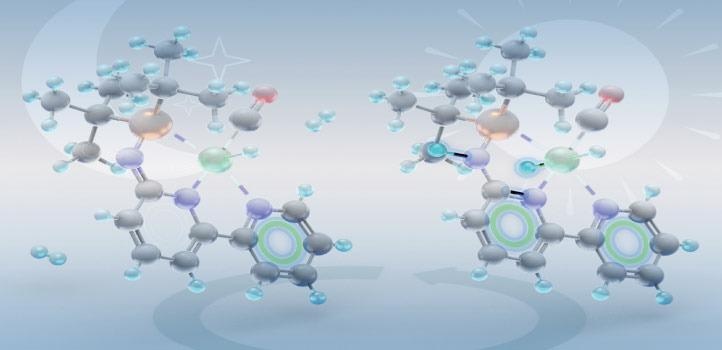May 3 2021
Scientists from King Abdullah University of Science and Technology (KAUST) have demonstrated a concept known as aromaticity that is often used to describe the unusual reactivity and excellent stability of some carbon-based molecules.
 An unusual family of catalysts developed at KAUST shows high catalytic performance for certain reactions, such as selective hydrogen production from formic acid. Image Credit: Reproduced from Gonçalves et al. (2021) with permission from the Royal Society of Chemistry. Original artwork Heno Hwang.
An unusual family of catalysts developed at KAUST shows high catalytic performance for certain reactions, such as selective hydrogen production from formic acid. Image Credit: Reproduced from Gonçalves et al. (2021) with permission from the Royal Society of Chemistry. Original artwork Heno Hwang.
This concept could lead to the design of new catalysts with novel applications. At first, in the 19th century, chemists discovered the anomalous behavior of aromatic molecules while analyzing benzene. The unpredicted stability of this six-carbon cyclic structure is mainly due to its electrons.
Generally, bonding electrons tend to hold a particular pair of atoms jointly in a discrete chemical bond. However, in the case of benzene, six electrons develop a delocalized ring over the molecule. This feature is shared by a host of other molecules.
Many classic examples of organic and organometallic reactivity can be explained on this basis. But although the concept is well known, there are limited practical chemical applications of aromaticity.
Théo Gonçalves, Research Scientist, Kuo-Wei Huang’s Lab, King Abdullah University of Science and Technology
Aromaticity can find practical application in the field of catalysis. In recent times, Huang’s team developed a unique family of catalysts known as PN3(P) pincer complexes. In a majority of the catalysts, the central metal ion is where the making and breaking of bonds occur.
In the case of PN3(P) complexes, the pincer ligands surrounding the metal can even serve as active participants in the catalytic process.
“Our PN3(P) ligand platform enables catalytic applications beyond conventional systems where metal is the center of reactivity,” stated Huang.
Since the researchers studied the catalytic behavior of pincer complexes, they demonstrated that a six-membered ring structure transiently develops at the time of catalysis and that aromaticity was involved.
We have provided strong evidence that during the catalytic cycle, our catalysis benefits from the additional energy coming from aromatization of the ring. Tuning the degree of aromatization will gently tune the reaction output.
Théo Gonçalves, Research Scientist, Kuo-Wei Huang’s Lab, King Abdullah University of Science and Technology
The PN3(P) pincer family holds high catalytic performance for reactions like the selective hydrogen production from formic acid to reduce carbon dioxide (CO2) and to make imines and esters. However, the actual value of the study could be in the form of the new understanding it offers into the role of aromaticity in catalysis, as well as the new prospects that open up consequently.
Prior to our work, the importance of the aromaticity was not highlighted in this field. Fundamentally understanding aromatization and dearomatization will allow redesign of catalysts towards better performance and perhaps novel reactivity.
Théo Gonçalves, Research Scientist, Kuo-Wei Huang’s Lab, King Abdullah University of Science and Technology
“Our discovery is not about identifying a new or better catalyst for a known reaction, but about opening a new field for unlimited new opportunities in the future,” added Huang.
Journal Reference:
Gonçalves, T. P., et al. (2021) Aromaticity in catalysis: metal ligand cooperation via ligand dearomatization and rearomatization. Chemical Communications. doi.org/10.1039/D1CC00528F.